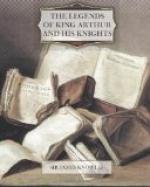And as he rode, he met his cousin Sir Andret, who had been commanded by King Mark to bring home to him two knights of King Arthur’s court who roamed the country thereabouts seeking adventures.
“What tidings?” said Sir Tristram.
“God help me, never worse,” replied his cousin; “for those I went to bring have beaten and defeated me, and set my message at naught.”
“Fair cousin,” said Sir Tristram, “ride ye on your way, perchance if I should meet them ye may be revenged.”
So Sir Andret rode into Cornwall, but Sir Tristram rode after the two knights who had misused him, namely, Sir Sagramour le Desirous, and Sir Dodinas le Savage. And before long he saw them but a little way before him.
“Sir,” said Governale, “by my advice thou wilt leave them alone, for they be two well-proved knights of Arthur’s court.”
“Shall I not therefore rather meet them?” said Sir Tristram, and, riding swiftly after them, he called to them to stop, and asked them whence they came, and whither they were going, and what they were doing in those marches.
Sir Sagramour looked haughtily at Sir Tristram, and made mocking of his words, and said, “Fair knight, be ye a knight of Cornwall?”
“Wherefore askest thou that?” said Tristram.
“Truly, because it is full seldom seen,” replied Sir Sagramour, “that Cornish knights are valiant with their arms as with their tongues. It is but two hours since there met us such a Cornish knight, who spoke great words with might and prowess, but anon, with little mastery, he was laid on earth, as I trow wilt thou be also.”
“Fair lords,” said Sir Tristram, “it may chance I be a better man than he; but, be that as it may, he was my cousin, and for his sake I will assail ye both; one Cornish knight against ye two.”
When Sir Dodinas le Savage heard this speech, he caught at his spear and said, “Sir knight, keep well thyself;” and then they parted and came together as it had been thunder, and Sir Dodinas’ spear split asunder; but Sir Tristram smote him with so full a stroke as hurled him over his horse’s crupper, and nearly brake his neck. Sir Sagramour, seeing his fellow’s fall, marvelled who this new knight might be, and dressed his spear, and came against Sir Tristram as a whirlwind; but Sir Tristram smote him a mighty buffet, and rolled him with his horse down on the ground; and in the falling he brake his thigh.
Then, looking at them both as they lay grovelling on the grass, Sir Tristram said, “Fair knights, will ye joust any more? Are there no bigger knights in King Arthur’s court? Will ye soon again speak shame of Cornish knights?”
“Thou hast defeated us, in truth,” replied Sir Sagramour, “and on the faith of knighthood I require thee tell us thy right name?”
“Ye charge me by a great thing,” said Sir Tristram, “and I will answer ye.”
And when they heard his name the two knights were right glad that they had met Sir Tristram, for his deeds were known through all the land, and they prayed him to abide in their company.




